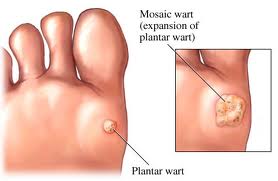Although it’s been much cooler this week on the First Coast, we’ve been seeing record high temperatures for these winter months in Jacksonville FL. This leaves some of us wanting to slide into flip-flops, go to the beach or lounge by pools. With many of us tempted to slip off our shoes and enjoy these public areas, precautions should be taken when considering going bare foot. Not to make you a “worry wart” but here are a few things to consider.  Where are plantar warts?:The common wart is known as verruca vulgaris. Wartstypically appear as small, single spots of thickened, scaly skin or in multiples clustered over larger areas. Clustered warts are referred to as mosaic warts. When found on the bottom of the foot, they are called plantar warts (verruca plantaris). The name "plantar" is derived from the location of the foot on which they are found; the bottom of the foot is called the plantar region. It is estimated that between 7-10% of the U.S. population is infected with plantar warts at any given time. How to tell if you have a wart or a callus: Plantar warts often resemble plantar calluses. A simple way to differentiate between a wart and a callous is to lightly pinch the lesion between two fingers. If this causes pain, it is likely that the lesion is a wart. A callous is generally not painful when pinched but can be tender by pressing directly on the lesion. A podiatrist should examine any lesion found on the feet. What causes warts: Warts are caused by an infection of the skin due to the human papillomavirus (HPV) as a result of direct contact with the virus. Caution must be taken since they are contagious and can spread to other parts of the body and to other people. They do not, however, spread through the bloodstream. They can be picked up rather easily in showers and around swimming pools. If an individual you live with has the infection, care should be taken to keep showers and tile flooring clean. Those who have plantar warts should not share shoes with other people. Valentine’s Day is right around the corner. Give someone special a box of chocolates or a dozen roses… not plantar warts! How to treat or remove plantar warts:
Where are plantar warts?:The common wart is known as verruca vulgaris. Wartstypically appear as small, single spots of thickened, scaly skin or in multiples clustered over larger areas. Clustered warts are referred to as mosaic warts. When found on the bottom of the foot, they are called plantar warts (verruca plantaris). The name "plantar" is derived from the location of the foot on which they are found; the bottom of the foot is called the plantar region. It is estimated that between 7-10% of the U.S. population is infected with plantar warts at any given time. How to tell if you have a wart or a callus: Plantar warts often resemble plantar calluses. A simple way to differentiate between a wart and a callous is to lightly pinch the lesion between two fingers. If this causes pain, it is likely that the lesion is a wart. A callous is generally not painful when pinched but can be tender by pressing directly on the lesion. A podiatrist should examine any lesion found on the feet. What causes warts: Warts are caused by an infection of the skin due to the human papillomavirus (HPV) as a result of direct contact with the virus. Caution must be taken since they are contagious and can spread to other parts of the body and to other people. They do not, however, spread through the bloodstream. They can be picked up rather easily in showers and around swimming pools. If an individual you live with has the infection, care should be taken to keep showers and tile flooring clean. Those who have plantar warts should not share shoes with other people. Valentine’s Day is right around the corner. Give someone special a box of chocolates or a dozen roses… not plantar warts! How to treat or remove plantar warts:
- Chemical/medicinal treatment; salicylic acids
- Cryogenics
- Hyfrecation
- Laser treatment
- Needling
- Surgical removal via blunt dissection
If you or someone you know has any discomfort caused by a potential plantar wart or calluses, make an appointment today at the First Coast Foot and Ankle Clinic in our Jacksonville location. Dr. Reddy can help you determine which treatment plan is most appropriate… don’t try to remove them yourself as you may do more harm than good.
Share this article